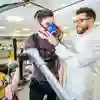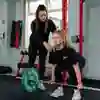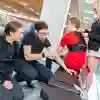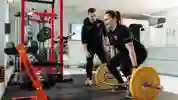


Open up a range of careers by learning how to help athletes improve their performance and how to protect the general public's health and wellbeing through exercise.
You’ll start by developing a thorough understanding of the different scientific principles involved – such as physiology, psychology and biomechanics – to give you the foundation to work as a qualified professional in either a health or sports and performance setting.
And you’ll take your employability prospects to the next level with a series of hands-on and sometimes exclusive placement opportunities, CV-boosting volunteering and career-inspiring experiences to help you stand out from the competition.
About this course
Why choose Hull for Sport and Exercise Science? Because we’re well connected. You can tap into our close links with Hull City, Hull KR and Hull FC (all three clubs have former Hull students working for them) or with the NHS, nutritional health providers and schools. And that means you could get access to elite athletes, industry experts, possible internships and more.
They’re all part of our extensive work-based placement programme that gives you the chance to put your theory to the test in real-world scenarios.
You’ll be learning that theory in some of the best facilities in the industry right here on campus and you’ll be able to decide what you want to study in your final year. You can follow your passions and interests in psychology, biomechanics, physiology or nutrition and choose whether you want to focus on health and exercise, or sports and performance.
You’ll have the chance to showcase your final-year project at our Student Thesis Conference, celebrating your research alongside fellow students and professionals. It’s a fantastic way to develop presentation skills, make even more industry connections, and share your passion for sport and exercise science - learn more here.
Add it all up, and you’ll leave here a well-rounded science graduate with standout industry experience. Just what you need to pursue a truly rewarding career.
Study speed, stamina and agility at your own pace
Module options
Each year, you’ll study modules worth a certain number of credits, and you need 120 credits per year. Most modules are 20 credits – so you’ll study six modules each year. Some longer modules, such as a dissertation, are worth more. In these cases, you’ll study fewer modules - but the number of credits will always add up to 120. Some modules are compulsory, some are optional, so you can build a course that’s right for you.
Filters
Human Physiology and Nutrition
Examine the key body systems including the circulatory, respiratory, nervous and gastrointestinal – in relation to metabolism, energy production and macronutrient function.
core
20 credits
Principles of Anatomy and Biomechanics
Explore anatomical structures of the musculoskeletal system and how they relate to functional human movement.
core
20 credits
Introduction to Practice in Sport and Exercise Science
This module is designed to show students how each sub-discipline of sport science can work with the rest to create an interdisciplinary group, working towards a common goal. In doing so, students will gain an understanding and appreciation for how modules throughout the rest of their programme will be linked together, and how they might be able to work with other disciplines upon graduation.
core
20 credits
Sport, Health and Exercise Psychology
This module provides you with knowledge of various psychological assessment tools and techniques, such as anxiety inventories, imagery, relaxation and goal setting.
core
20 credits
Conducting Science in Sport, Exercise and Rehabilitation
A solid grounding in to the scientific practice underlying the subject. It explores and critiques how data is collected and analysed.
core
20 credits
Introduction to Exercise and Training
Through a mix of both theoretical and practical sessions, you'll develop your knowledge and experience of a number of different exercise and training modalities that a strength and conditioning coach could utilise in an effort to affect and improve performance. This module will also help you to develop as a coach, explaining the principles of good coaching, communication and delivery to a diverse range of athletes and non-athletes alike.
core
20 credits
Social Psychology of Sport, Health and Exercise
Examine the effects of psychosocial dynamics in performance sport, health and exercise. You'll explore issues like muscle dysmorphia, drug use in sport and barriers to exercise.
core
20 credits
Sport Physiology
Examine the fundamentals of physiology in the context of sports performance. This module introduces methods of measuring performance and and physiological responses during sport.
core
20 credits
Analysis of Human Movement
Explore the biomechanical methods to analyse human movement - including kinematics and kinetics using motion capture and force plates.
core
20 credits
Our facilities


Watchlist
Degrees that live up to life
Course montage
1 min
Dr Stephen Heyes
Course overview
1 min
Andy Ayre
Student Story
2 mins
Facilities
Course Highlight
3 mins
Strength and Conditioning Course Overview
Course overview
2 mins
Featured academics
Our experts are committed to the development of sporting excellence; promoting health and wellbeing; and advancements in recovery from injury or illness.
As well as a thriving education portfolio encompassing a range of courses, our academics are at the cutting edge of research in this field.

Dr Kate Donnan
Lecturer
Kate is a lecturer in sport and exercise psychology. Her research focuses mainly on the impact of stressors such as sleep deprivation or extreme environments on human performance and the use of psychological or nutritional strategies to improve this.

Phil Marshall
Lecturer in Strength & Conditioning
Phil is an NSCA- and UKSCA-accredited strength and conditioning coach and a UK athletics performance coach with more than 20 years of coaching experience.
Entry Requirements
What do I need?
This course is currently available through Clearing, which means our entry requirements are a bit different to what they would normally be.
At Hull, you're a name not a number. During Clearing, we look at all of your qualifications and experience, not just your academic grades. We may be able to offer you a place whatever your situation. Get started by completing our eligibility checker, and find out immediately if you could study at the University of Hull.
Have questions? Our admissions team will be happy to help.
Fees & Funding
How much is it?

Future prospects
On these degrees, you’ll gain theoretical knowledge and real-world skills that are relevant to this growing market. So, when you graduate, you’ll be ready to work in specialist areas like professional sport, personal training and a range of NHS roles, or enter the NHS Scientist Training Programme.
Our careers team will be on-hand to give you expert advice and training, and you’ll have the chance to network with a wide range of employers throughout your degree as part of our annual Student Thesis Conference.
Become part of the next generation of futuremakers
Like what you've seen? Then it's time to apply.
The standard way is to apply through UCAS. This will give you the chance to showcase your skills qualities and passion for the subject, as well as providing us with your academic qualifications.
Not ready to apply yet?
Visit our next Open Day, and see all that the University of Hull has to offer. Talk to our lecturers about your subject, find out what university is really like from our current students, and take a tour of our beautiful campus and amazing facilities.
You may also be interested in...
94% employability (Sport, Exercise and Rehabilitation Sciences) UK domicile full-time first degree leavers; Higher Education Graduate Outcomes statistics, for the academic year 2022/23, published by the Higher Education Statistics Agency June 2025.
Ranked 8th in the UK for teaching on my course. National Student Survey (NSS) 2025, HEIs only
Sport and Exercise Science: Ranked 1st in the UK for academic support. National Student Survey (NSS) 2025, HEIs only
All modules presented on this course page are subject to availability and this list may change at any time.